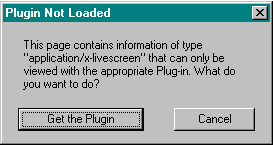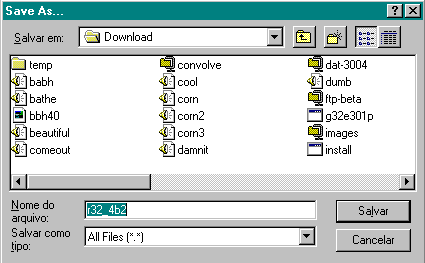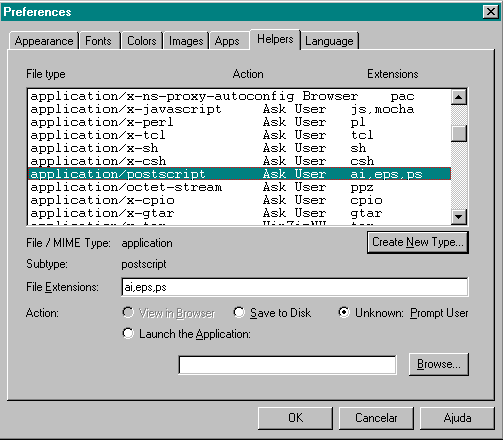
Some of the articles in "Brain & Mind" Magazine feature video clips (movies) and audio files.
In order to view correctly these files, your WWW browser (Netscape, Internet Explorer, etc.) needs a special program for each file type. These programs are called "helpers" or "plug-ins". Normally, the browser comes without these programs, so if you don't have them, you will need to install them, following a simple procedure. Just follow the steps below:
If you click on an icon or link in the Magazine which calls a video or audio clip, a warning message will appear, such as this (Netscape):

Just click on the Get the Plugin button and proceed to the installation phase.
If nothing of the sort appears, and the video or audio file plays well, then you have the plug-in.
Sometimes, depending on the file, another kind of warning may appear (Unknown File Type). In this case, click on the Pick App... button.

It will depend on the type of file. See the table below:
| File | Extension | Recommended Plug-In |
| AVI movie files | .avi | Windows Media Player * |
| MPEG movie files | .mpg .mpeg | MPEG Player |
| MOV movie files | .mov | Apple QuickTime Viewer |
| QuickTIme movies | .qt | Apple QuickTIme Viewer |
| Wave sound files | .wav | Windows Media Player * |
| RealAudio files | .ra | RealAudio Player |
* No need to download: it comes in your Windows directory. To install it, go directly to the browser options phase.
That's easy. You get them by downloading them from specific server sites in the Internet. Just click on the name of the plug-in above, and you will get a shareware copy which will be copied to your computer. After choosing the right version for your system (in this case, Windows 3.1, Windows 95, Windows NT or Macintosh, a box like this will appear on your screen:

Choose the C:\TEMP directory in the file dialog box, to store the download; such as in the example below:

After the downloading is complete, go to the Disk Explorer program or File Manager program of your computer, and select the C:\TEMP file. Click twice on the name of the file you have downloaded, and follow the instructions given by the installation program or wizard. Some installation programs require that you close your browser before proceeding.
Some plug-ins search themselves for the location of your browser, and install automatically. Other plug-ins will require that you inform your browser what is the name of the program you are using for a specific type of video or audio file (see the next question).
 Some
programs should be declared in order that the browser uses them when a
specific file must be viewed. He give Netscape as an example here:
Some
programs should be declared in order that the browser uses them when a
specific file must be viewed. He give Netscape as an example here:
Your program is now prepared to launch the help application to view the file every time it comes down from the Internet
Repeat this for each one of the helper applications you have downloaded.
By: Renato M.E. Sabbatini,
PhD
For: Brain & Mind Magazine
Copyright Silvia Helena Cardoso (c) 1997 State University of Campinas